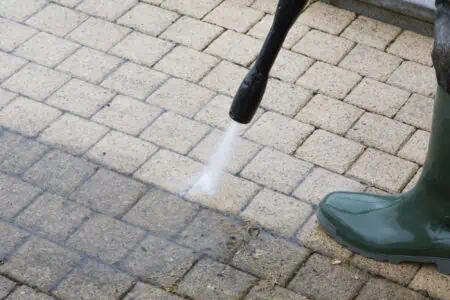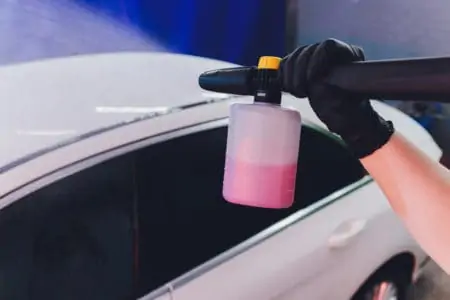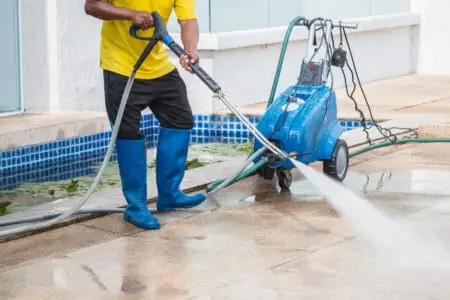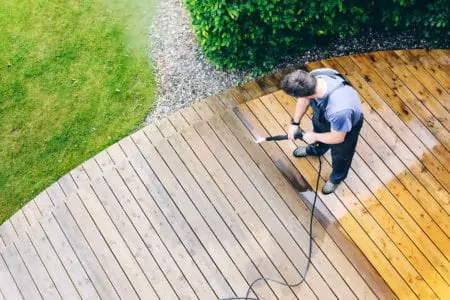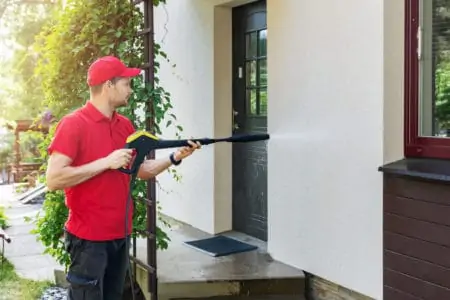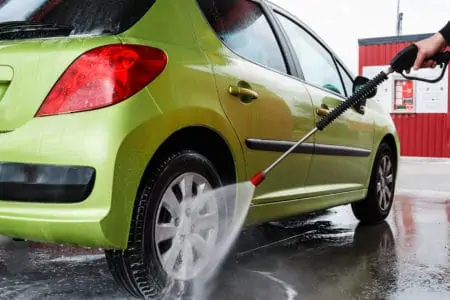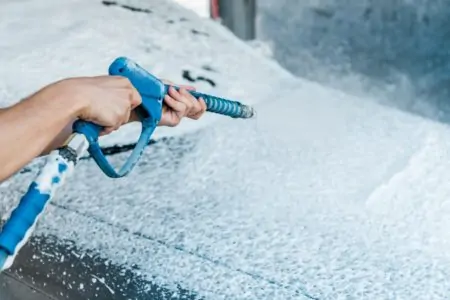Pressure washing is a great and powerful way to clean houses, boats, cars, and the exterior of your home. But do you want to learn a little more about this cleaning method?
We’re here to share 10 interesting pressure washing facts and statistics. This will include random fun facts and key facts about the industry.
Our research has also led us to answer some pretty important questions about pressure washing. Keep reading to learn more.
Top 10 Pressure Washing Facts and Statistics
- Pressure washing can minimize allergens by removing mold, dust, and bacteria.
- A pressure washer is suitable for firm surfaces like vehicles and roofs, but it’s not suitable for watering plants or cleaning fabric furniture.
- Pressure washing your house yearly will prolong the paintwork.
- Pressure washing can be dangerous. You can cause wounds in yourself or others, and there’s a risk of electric shock.
- A pressure washer comes with five different nozzles for various uses.
- The pressure washer market size is worth 1.95 billion dollars.
- The largest share of the pressure washer industry is within the garden washer sector.
- The leading brands include Revive Powerwashing Inc. and Karcher.
- 93.9 percent of pressure washer workers are male, earning two percent more than their female counterparts.
- The industry is growing at a fast rate, primarily due to more people buying their own pressure washers.
Pressure Washing Fun Facts
We know that many people love pressure washing and find it a fun way to clean. The before and after results are so satisfying.
We’re about to add to the party by bringing you five awesome pressure washer facts and statistics.
- Pressure washing can minimize allergens: Since pressure washing provides such a powerful blast of water, it can remove common allergens. This includes fungi, mold, dust, mildew, bacteria, algae, and more. Many areas of your home, like the roof and siding, can collect these allergens. Regular cleaning can remove them and, in turn, improve allergies.
- A pressure washer isn’t universal: Maybe your recent pressure washer investment has been disappointing since you realized you can’t use it for cleaning everything. It’s ideal for cleaning pool decks, siding, the driveway, roof, windows, cars, and more firm surfaces. But you can’t use it to wash your dog or clean plastic furniture, and it’s not suitable for outdoor fabrics or watering plants. The pressure is just too high!
- It protects the paintwork: Pressure washing your house every year will help the exterior paint job last much longer. This is a lot cheaper than having to repaint your home, too. Plus, if you want to sell your house, this is a big benefit. You can get more money if your house is in better aesthetic condition.
- Pressure washing is dangerous: A pressure washer differs from a garden hose — it’s simply much more powerful. If you’re not careful, a pressure washer can cause serious wounds. It can also knock over objects which can injure others. Another risk is an electric shock if you don’t follow safety protocols.
Always read the user manual to ensure you’re following safety protocol and not taking any risks. - A pressure washer comes with different nozzles: A pressure washer usually comes with five nozzles: 0-degree, 15-degree, 25-degree, 40-degree, and 65-degree. They range from super strong to weaker, respectively. We recommend starting with a 40-degree nozzle and working up to zero. The 65-degree nozzle is best for dispensing soap.
Pressure Washing Industry Statistics
Perhaps you’re wondering about the pressure washing industry and what is happening there. We’ll discuss some key facts, so you know more about this world.
- Pressure washer global market size: The pressure washer market was worth 1.95 billion dollars in 2020 (1). The predicted revenue forecast for 2025 is 2.3 billion, with more houses and cars appearing worldwide.
- Pressure washers are most common for garden use: The largest share of the pressure washer industry was within the garden washer sector. Next up was for cleaning cars, with home exterior following closely behind. Pressure washer marketing is definitely gearing more towards residential use at the moment.
- Leading brands for pressure washing: The most prominent pressure washer key brands include Revive Powerwashing Inc., Karcher, Dewalt, Stanley Black & Decker Ltd., and Generac Power System Inc.
- Pressure washer worker demographics: Within the industry, 93.9 percent of workers are male, and 6.1 percent are female (2). The male income is slightly higher, earning two percent more than women. Sixty-one percent of pressure washers are White, 17.2 percent are Hispanic or Latino, and 13.1 percent are Black or African-American.
- What’s pushing the industry to grow? As forecasted, the industry is set to grow significantly over the next few years. The driving factors behind that growth include more people buying their own pressure washers and, therefore, an increase in demand (3). Many people are also switching from gas to electric pressure washers, while others are keen on cordless machines.
More people are hiring professional cleaning services, too. Finally, more people are owning vehicles, increasing the need for quality cleaning tools.
